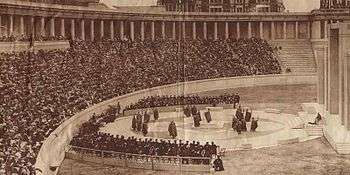Lewisohn Stadium
Lewisohn Stadium was an amphitheater and athletic facility built on the campus of the City College of New York. It opened in 1915 and was demolished in 1973.

History
The Doric-colonnaded amphitheater was built between Amsterdam and Convent Avenues, from 136th to 138th Streets.[1] Financier and philanthropist Adolph Lewisohn donated the money for construction.[2] It opened in 1915, with a seating capacity of 8,000.
The stadium hosted many athletic, musical, and theatrical events. It was one of New York's public landmarks.[1][2]
Lewisohn Stadium was demolished in 1973 to make way for the $125 million North Academic Center.[3] In 1985, a plaza outside the Center was rededicated as the Lewisohn Plaza, in memory of the stadium and its philanthropist.[2]Graduation ceremonies for the class of 1969 was held at the Felt Forum of Madison Square Garden.
Athletics
The CCNY football team played its home games at Lewisohn from 1921 to 1950. The final game played was a 33–6 Beavers victory over Lowell Textile on November 18, 1950, in front of 300 fans.[4] (It was CCNY's only win that season, and the program was discontinued the following year.)
Along with Jasper Oval (right across Convent Avenue, also now demolished), Lewisohn was used throughout the academic year for many of the college's uptown campus outdoor intramural sports.
The CCNY Varsity Rifle Team had its indoor, 50' small bore range under the stadium steps, entered through a doorway at the north end. For many years, the CCNY Rifle Team excelled in national, regional and local competition and was consistently in the NRA-sponsored Top Ten national ranking, with the best record of any team at CCNY. Unfortunately, the team dissolved within 3 years of the loss of Lewisohn. The range was notoriously loud, with a steel backstop and concrete walls, and no acoustic insulation.[5]
Classical concerts
Besides sporting events, the stadium was used for performances starting in 1918.[2] Performers included Ella Fitzgerald, Louis Armstrong, the Metropolitan Opera, the New York Philharmonic (sometimes called the "Stadium Symphony Orchestra"), Renata Tebaldi Kirsten Flagstad, Marian Anderson, Alfredo Antonini,[6] and Eugene Ormandy. Leopold Stokowski made a series of recordings for Everest with the "Stadium Symphony Orchestra of New York." George Gershwin played his Rhapsody in Blue. Performers ranged from Van Cliburn, Jascha Heifetz, and Yehudi Menuhin to Leontyne Price, Roberta Peters, Licia Albanese,[7] Jan Peerce, Richard Tucker, Placido Domingo, Pete Seeger, Lotte Lenya, Thomas Hayward (tenor), Harry Belafonte, Jack Benny, Benny Goodman,[6] and conductor Kurt Adler of the Metropolitan Opera. Due to declining attendances, the concerts were discontinued in 1966.[2]
Other uses
The stadium was used by City College for its commencement exercises. All CCNY campuses took part, including Liberal Arts, Engineering and Architecture, and its Manhattan Business School (now Baruch College). This practice continued through June 1973.
It was also used for CCNY's annual Army ROTC's reviews at the end of each academic year.
In film
The stadium appeared as the setting of the final scene of the 1945 film Rhapsody in Blue in which Oscar Levant performs the title composition, with an orchestra conducted by Paul Whiteman, as a memorial to the composer. The derelict stadium was also used in the 1973 film Serpico, directed by Sidney Lumet, in a scene with Tony Roberts and Al Pacino.
References
- "Chief Points of Interest in Upper Manhattan". Automobile Blue Book. 1920.
- Rimer, Sara (May 15, 1985). "Commemorating Lewisohn Stadium". The New York Times.
- Horsley, Carter B. (April 5, 1973). "Lewisohn Stadium, Center for Culture, to Be Razed". New York Times. Retrieved December 15, 2008.
A $90-million academic center is planned to replace Lewisohn Stadium-the amphitheater and athletic field of City College that served as the city's summer cultural center for about half a century.
- Luchter, P.S. (June 2, 2018). "College of the City of New York (CCNY) All-time football records". Lucky's Amazing Sports Lists. Retrieved February 4, 2019.
- David Keller, CCNY '67, member CCNY Varsity Rifle Team
- Stern, Jonathan (2009). Music for the (American) People: The Concerts at Lewisohn Stadium, 1922-1964 (Ph.D.). I. New York: The City University of New York (CUNY) Graduate Center. pp. 204–205. Retrieved February 4, 2019.
- Stadium Concerts, Inc. (June 22, 1959), Stadium Concerts Review, Stadium Symphony Orchestra, Lewisohn Stadium, College of the City of New York, XLII, Herald Square Press, Inc., p. 17
External links
- The Lost World of CCNY: Architectural Gems of Our Past at The City College Library
- 1952 Concert at Lewisohn Stadium with Marian Anderson and Mischa Elman at The WNYC Archives
- Alfredo Antonini, Richard Tucker, Licia Albanese in concert at Lewisohn Stadium broadcast on the radio as cataloged at WNYC.org